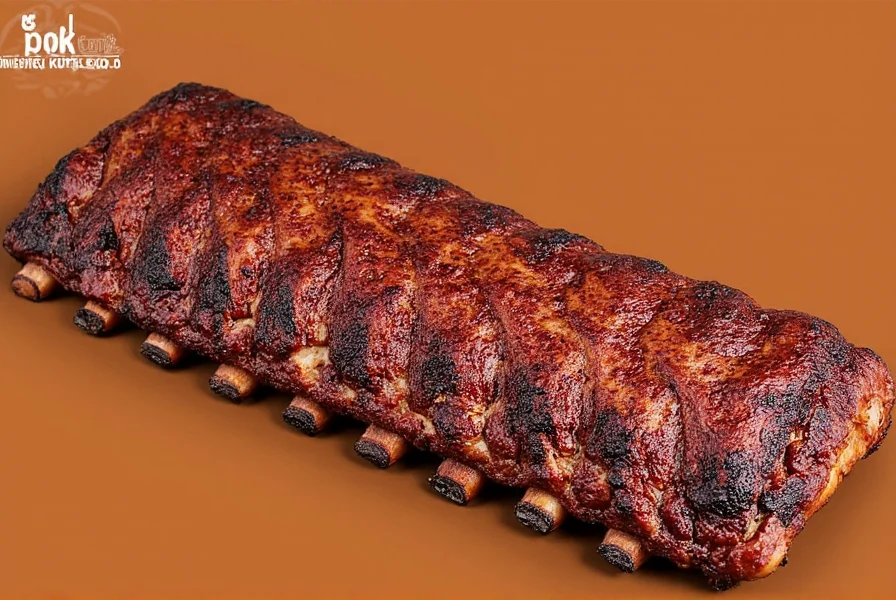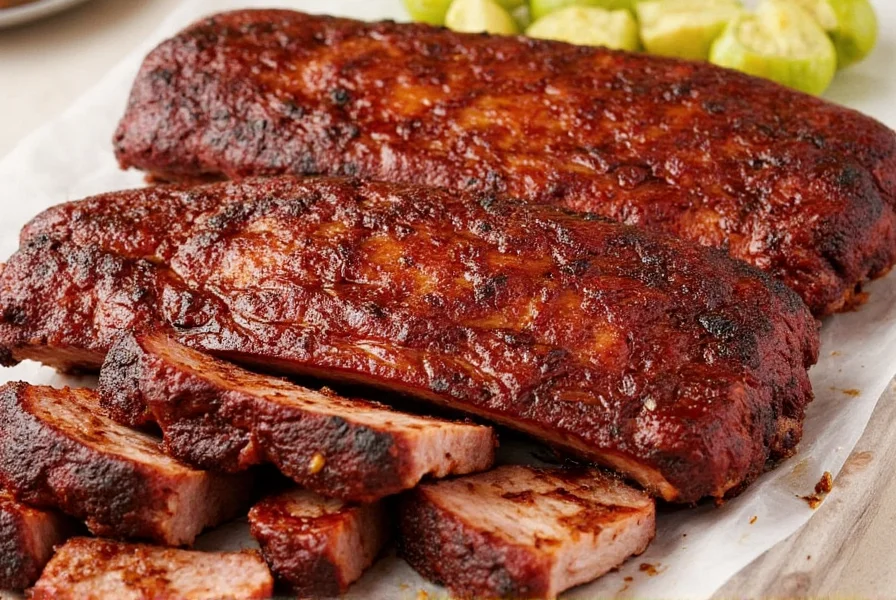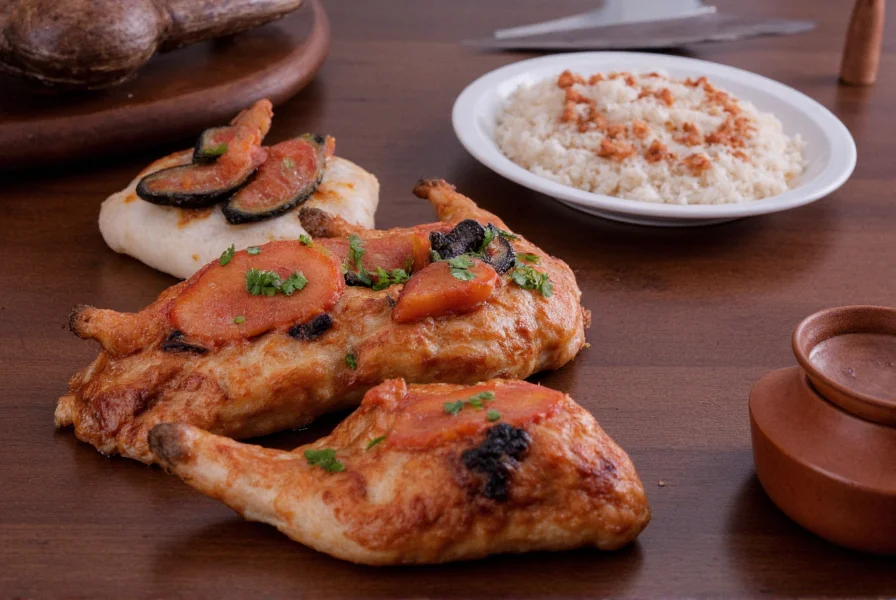Table of Contents
- Introduction
- What Are St. Louis Style Ribs?
- Why Pork Ribs Rule the Pit
- Beef Ribs: The Bold New Contender
- Pork vs Beef: Side-by-Side Showdown
- Spicing It Up – Flavor Tips for Both Ribs
- Buying Guide – How to Pick the Perfect Racks
- Cooking Tips for Tender, Tasty Results
- FAQs About St. Louis Style Ribs
- Conclusion
Introduction
St. Louis style ribs are traditionally made from pork, not beef. While some modern barbecue establishments incorrectly label beef ribs as "St. Louis style," the term originally refers to a specific pork cut trimmed into a rectangular shape with the sternum bone removed. This guide explains the truth behind the confusion, the key differences between pork and beef ribs, and how to choose the right cut for your cookout.
Whether you're a seasoned pitmaster or just firing up your first smoker, understanding these differences will help you pick the best ribs and achieve perfect results every time.

What Are St. Louis Style Ribs?
The term "St. Louis Style" correctly refers only to pork ribs that have been trimmed into a rectangular shape with the sternum bone removed. However, some modern barbecue restaurants and butchers incorrectly apply this term to beef ribs, causing widespread confusion. Here's the factual distinction:
- Pork St. Louis Style Ribs: These come from the belly side of the hog and are trimmed into a rectangular shape with the sternum bone removed. They're meatier than baby back ribs and have more fat, making them perfect for slow smoking.
- Beef St. Louis Style Ribs: This is a marketing misnomer. True St. Louis style refers exclusively to pork. Beef ribs cut in a similar rectangular shape are properly called "beef short ribs" or "beef back ribs."

Why Pork Ribs Rule the Pit
When it comes to classic barbecue, nothing beats the rich, smoky flavor of pork ribs done right. Here's why authentic St. Louis pork ribs still dominate the grill:
- Fat Distribution: More marbling = more flavor + more forgiving cook times.
- Easier to Find: Most butcher shops and supermarkets carry them year-round.
- Classic BBQ Texture: You get a nice balance between chew and fall-off-the-bone tenderness.
- Better Glaze Adherence: Sauce clings beautifully to pork — especially after a dry rub or mop application.

Beef Ribs: The Bold New Contender
While "St. Louis style" should only describe pork, beef short ribs have gained popularity as a bold alternative. If you love big, bold flavors and hearty textures, these might just become your new favorite weekend project:
- Bold Flavor: Think beef short rib meets prime rib — intense umami and richness.
- Meaty and Hearty: Great for carnivores who want something more substantial than pork.
- Less Common, More Impressive: Serve beef short ribs at your next cookout and watch jaws drop.
- Smokey Depth: When smoked low and slow, the beef takes on a robust, almost gamey character that pork just can't match.

| Feature | Pork St. Louis Ribs | Beef Short Ribs |
|---|---|---|
| Origin | Pig ribcage (belly area) | Cow ribcage (lower section) |
| Flavor Profile | Sweet, savory, smoky | Rich, earthy, bold umami |
| Cook Time | 4–6 hours at 225°F | 6–8 hours at 225°F |
| Texture | Tender with slight chew | Dense, juicy, buttery when cooked right |
| Cost per Pound | $3–$6 | $7–$12 |
| Best For | Weekend smokers, family BBQs | Special occasions, meat lovers |
Spicing It Up – Flavor Tips for Both Ribs
Whether you're team pork or team beef, spice is where you can make or break the flavor. Here's how to nail it every time:
- Kansas City Style: Sweet, tomato-based sauce; use brown sugar, paprika, garlic, and chili powder in the rub.
- Texas Dry Rub: Smoky and peppery; mix coarse black pepper, salt, cumin, and a dash of cayenne.
- Carolina Gold: Tangy mustard base; ideal for pork with yellow mustard, turmeric, vinegar, and honey.
- Tex-Mex Twist: Chipotle, cumin, lime zest, and coriander — pairs great with beef ribs.
- Asian Fusion: Soy sauce, ginger, five-spice powder, and sesame oil — a modern take on traditional ribs.

Buying Guide – How to Pick the Perfect Racks
Choosing high-quality ribs is half the battle. Here's how to spot the best cuts:
Pork St. Louis Style Ribs Buying Tips
- Look for Even Fat Layer: Uniform fat cap ensures even cooking.
- Trimmed Properly: Check if the sternum bone is cleanly removed and the rack is squared off.
- Color: Fresh pinkish-red color without gray or green tinge.
- Size: Aim for 2–3 lbs per rack — enough meat without being too fatty.
- Brands to Look For: Omaha Steaks, Snake River Farms, Costco Premium Cuts.
Beef Short Ribs Buying Tips
- Muscle Marbling: Visible streaks of fat mean juicier results.
- Thicker Bones: Meat should cling tightly to bones, not flaking off.
- Aging: Choose USDA Prime or Choice for maximum flavor and tenderness.
- Portion: Expect to serve about 1–1.5 lbs per person due to density.
- Recommended Sellers: Crowd Cow, D'Artagnan, local specialty butchers.

Cooking Tips for Tender, Tasty Results
No matter which type of rib you choose, mastering the technique is key:
- Prep Your Ribs: Remove the membrane from pork, and trim excess fat from beef for better bark formation.
- Apply the Rub Generously: Let sit for at least 1 hour before cooking — ideally overnight.
- Use the Low and Slow Method: Maintain a steady 225°F temperature for tender results.
- Wrap in Foil (Optional): After 4–5 hours, wrap in foil with apple juice or broth to speed up tenderizing.
- Glaze Before Finishing: Apply sauce last 30 minutes to avoid burning.
- Rest Before Serving: At least 10–15 minutes to let juices redistribute.

FAQs About St. Louis Style Ribs
If you're still wondering about the differences between pork and beef St. Louis style ribs, these frequently asked questions will clarify the most common points of confusion:
Are St. Louis style ribs always pork?
Yes. Traditionally, St. Louis style ribs refer exclusively to pork ribs that have been trimmed into a rectangular shape with the sternum bone removed. While some modern barbecue restaurants and butchers incorrectly apply the "St. Louis style" name to beef ribs, this is not technically correct according to traditional barbecue terminology. The Kansas City Barbeque Society and other authoritative sources confirm this definition.
What's the main difference between St. Louis style and baby back ribs?
St. Louis style pork ribs come from the belly section of the hog after the spare ribs have been trimmed, while baby backs come from the loin area near the spine. St. Louis style ribs are meatier and have more fat, making them better suited for longer smoking sessions compared to the more delicate baby backs.
Why are beef ribs sometimes called St. Louis style?
This is primarily a marketing term that's gained popularity in recent years. Traditional St. Louis style refers to pork, but some establishments use "St. Louis style" to describe a specific rectangular cut of beef ribs to leverage the name recognition of the pork version. True barbecue enthusiasts and professional organizations recognize that St. Louis style properly refers only to pork.
Which type cooks faster - pork or beef St. Louis ribs?
Pork St. Louis ribs typically cook faster, taking 4-6 hours at 225°F, while beef short ribs need 6-8 hours due to their denser meat structure and larger bone size. The beef version requires more time to break down connective tissues and achieve that tender, pull-apart texture.
Can I use the same rub for both pork and beef St. Louis ribs?
You can, but you'll get better results by tailoring your rub to each meat. Pork pairs well with sweeter rubs containing brown sugar or maple, while beef benefits from more robust spices like black pepper, cumin, and smoked paprika that complement its intense flavor without overwhelming it.
How do I know if I'm getting authentic St. Louis style pork ribs?
Authentic St. Louis style pork ribs should be a rectangular rack (about 5-6 bones) with the sternum bone removed, a consistent fat layer, and a meaty appearance. The rack should weigh 2-3 pounds. If you see a more irregular shape or significantly more bone than meat, it hasn't been properly trimmed to St. Louis specifications.
Conclusion
So, are St. Louis style ribs pork or beef? The definitive answer is: traditionally and correctly, they're pork only. While some establishments mislabel beef ribs as "St. Louis style," this is a marketing error. Authentic St. Louis style ribs are a specific pork cut with strict trimming standards.
Now that you know the truth, you can confidently choose the right ribs for your cookout. Whether you're smoking traditional pork St. Louis ribs or exploring beef short ribs, understanding these distinctions ensures you'll achieve perfect results every time.

Happy grilling!











 浙公网安备
33010002000092号
浙公网安备
33010002000092号 浙B2-20120091-4
浙B2-20120091-4